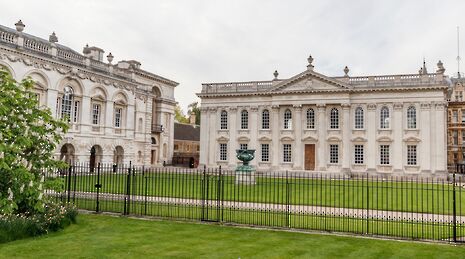Candidates backed by Cambridge UCU elected to University Council
Dr Nicholas Holmes, Dr Sam Ainsworth, Dr Ruth Charles, and Dr Andrew Sanchez are to join University Council next term as representatives of Regent House on Council

Both candidates backed by pro-divestment group Cambridge Zero Carbon and the local branch of the University and Colleges Union, Drs Sam Ainsworth and Andrew Sanchez, have been newly-elected to Cambridge’s executive decision-making body, University Council.
In a vote by members of Regent House, the University’s primary governing body, Drs Ainsworth and Sanchez were elected alongside Dr Nicholas Holmes and Dr Ruth Charles, who are both currently members of Council.
Dr Sanchez was narrowly elected as the fourth member of Council representing Regent House, winning slightly over one vote more than Dr Richard Anthony, a current member of Council and bursar of Jesus College.
Dr Holmes, a senior University lecturer in molecular immunology, received 197 first-preference votes, followed by Dr Ainsworth, a researcher in Cambridge’s Computer Laboratory, who received 165 first-choice votes out of 861 votes cast.
Dr Charles, head of user administration at the University Information Services, was re-elected with 147 first-choice votes, while Dr Sanchez, a lecturer in the Department of Anthropology, received 139 first-choice votes.
Those elected in the Regent House vote will join several other newly-elected academics on Council from 1st January 2019, and will serve for four years on the body.
Dr Jason Scott-Warren, a prominent pro-divestment voice in Cambridge and a reader in early modern literature at Gonville & Caius College, and Professor Richard Penty, a professor of engineering and current master of Sidney Sussex College, were elected to Council without opposition last month.
For the Heads of Colleges positions on Council, Professor Christopher Kelly, a classics professor and Master of Corpus Christi, was elected to Council in November, alongside Reverend Dr Jeremy Morris, a theologian and master of Trinity Hall, who was re-elected – both were unopposed.
Dr Kelly previously faced controversy when he was appointed as master of Corpus Christi, His tenure as Senior Tutor saw the introduction of an academic room ballot – a decision he defended in a letter to The Times.
Speaking to Varsity on his election, Dr Sanchez expressed his gratitude to those who voted for him, and said that he “look[s] forward to beginning work on the University Council”.
He added that those who believe that “students should be able to gain the most benefit from their education (irrespective of their background), that we should all be able to work and study in an environment free of harassment and prejudice, and that Cambridge makes the fullest and most ethical use of its position as a leading university” should “play a role in the governance structures of the university.”
Dr Ainsworth said that in his position as a member of Council, he “[is] looking forward to making sure that the voices of early-career researchers aren't lost at the University-level: a group of people who are so vital to the functioning of the University's research output, and yet the University has never fully understood how to provision for”.
His statement referred to recent controversy over a Council amendment to include in Regent House membership only research associates who have been employed by the University for at least three years continuously.
As well as Dr Anthony, Georgina Cannon, the sixth candidate for the role and the current head of major gifts in the University’s Development and Alumni Relations Office, was unsuccessful in her nomination to Council.
In a statement to Varsity, Cannon said, “I was honoured to be nominated by academic colleagues and was motivated to make a contribution to the University, its staff and students beyond my day job”, adding, “I wish the successful council members all the best in their new roles”.
- Updated, Wednesday 5th December: This article was updated to include a comment from Dr Ainsworth on his election
 News / Judge Business School advisor resigns over Epstein and Andrew links18 February 2026
News / Judge Business School advisor resigns over Epstein and Andrew links18 February 2026 News / Hundreds of Cambridge academics demand vote on fate of vet course20 February 2026
News / Hundreds of Cambridge academics demand vote on fate of vet course20 February 2026 News / Petition demands University reverse decision on vegan menu20 February 2026
News / Petition demands University reverse decision on vegan menu20 February 2026 News / CUCA members attend Reform rally in London20 February 2026
News / CUCA members attend Reform rally in London20 February 2026 News / Gov grants £36m to Cambridge supercomputer17 February 2026
News / Gov grants £36m to Cambridge supercomputer17 February 2026











